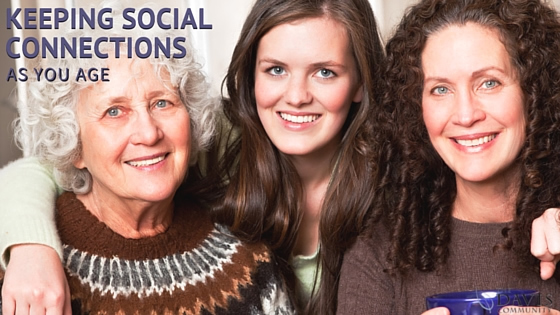Keeping Social Connections as You Age

Each new phase of life brings with it many changes, some more welcome than others. Maybe, like many others, you breathed a sigh of relief when you reached retirement, thinking that, with the responsibilities of working and raising a family behind you, you’d finally have some time to do what you wanted to do! And maybe shortly thereafter you realized that, without the constant demands and activity associated with work and family, it’s easy to become withdrawn and isolated. Is that such a bad thing?
Or perhaps you’ve noticed an older relative who used to be a social butterfly suddenly becoming a loner, rarely leaving the house or even speaking with others. How serious could it be?
Research has shown that social connections are important throughout our entire lives, and that importance does not diminish as we age. Social interactions have many mental, emotional, and physical benefits. People who remain socially active tend to have higher cognitive functioning levels and lower incidences of dementia and Alzheimer’s disease. As a matter of fact, one study found that highly social seniors had a 70% lower rate of cognitive decline! Social connections also help many to stay mentally healthy, avoiding loneliness and depression. Relationships and regular social interactions can also help to lower blood pressure, boost your immune system, and maybe even reduce the risk of certain cardiovascular problems, some cancers, osteoporosis, and rheumatoid arthritis.
Are you convinced? Here are a few ways to experience the benefits of social connections, either the old-fashioned way (in person) or through the use of technology.
Person to Person
- Volunteer. Opportunities to volunteer are almost endless. You won’t have to look far to find someplace where your help would be appreciated. You could spend some time at a school, library, or hospital, help to feed the hungry or house the homeless, or offer your services to a local civics, arts, or cultural organization.
- Join a club. Check with your local senior center or ask around to see if there are any clubs that interest you. Joining a group such as a book club, a garden club, or a chess club can be intellectually stimulating and will introduce you to others who share your interests.
- Take a class. Most adult education programs offer classes in everything from learning a new language to photography or basket weaving. Chances are that you’ll find something that interests you and make a few friends in the process.
- Join a gym. This not only gives you the opportunity to stay connected socially, but it has the added advantage of keeping you physically fit as well. You may even be able to join a fitness class especially geared towards seniors.
- Reach out to family and friends. If you have young grandchildren or other relatives nearby, their parents would probably appreciate an offer to babysit on occasion. And, if you’re physically able, there’s nothing like chasing children around to keep you young at heart! If babysitting is not an option, you can still make definite plans to share a meal or even a cup of coffee with family or friends.
Use Technology
You may prefer person-to-person interaction, but, if your friends and family live far away, this isn’t always an option. But keeping in touch with loved ones is easier today than ever before. Here are a few ways technology can help you to bridge the distance:
- Skype or FaceTime. These options take the phone call to the next level. In addition to hearing your loved one’s voice, many phones, tablets, and computers can give you the ability to see each other’s faces while you talk.
- E-mail. Similar in style to the old-fashioned “snail mail,” e-mail has the advantage of being almost instantaneous. And you’ll never have to worry about running out of stamps!
- Online social networks. Social networks like Facebook and Instagram are a great way to keep in touch by sharing photos or videos with your loved ones.
If computers are not your thing, don’t rule out these suggestions as impossible. You may want to take a class or ask a friend or relative to show you the ropes.
You can, and should, make every effort to stay socially connected. Maintaining meaningful relationships can keep you vibrant and active and will help you to enjoy the healthiest, most fulfilling life possible.
Visit the Davis Community’s Assisted Living in Wilmington NC
If you or a loved one are feeling isolated and alone, call the Davis Community today at 910.686.7195. We provide exceptional assisted living in Wilmington NC with a vibrant0 and supportive environment where you or your loved one will feel welcomed and part of an active community. Get to know the difference today – schedule a visit to the Davis Community!